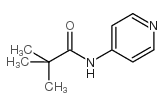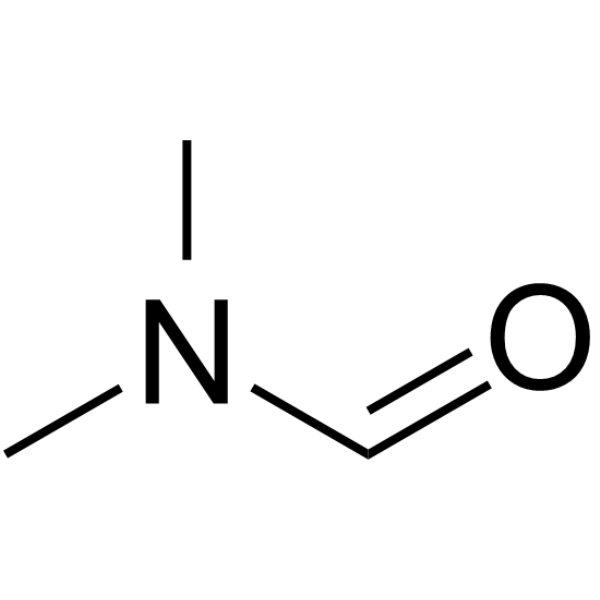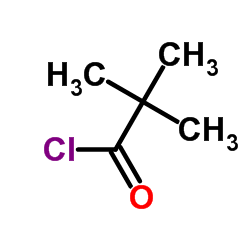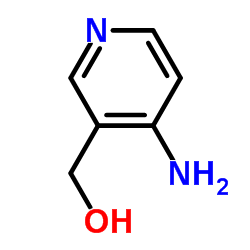N-(3-Formyl-4-pyridinyl)-2,2-dimethylpropanamide

N-(3-Formyl-4-pyridinyl)-2,2-dimethylpropanamide structure
|
Common Name | N-(3-Formyl-4-pyridinyl)-2,2-dimethylpropanamide | ||
|---|---|---|---|---|
| CAS Number | 86847-71-4 | Molecular Weight | 206.241 | |
| Density | 1.2±0.1 g/cm3 | Boiling Point | 406.1±30.0 °C at 760 mmHg | |
| Molecular Formula | C11H14N2O2 | Melting Point | 60-63ºC | |
| MSDS | USA | Flash Point | 199.4±24.6 °C | |
| Symbol |

GHS07 |
Signal Word | Warning | |
| Name | N-(3-Formyl-pyridin-4-yl)-2,2-dimethyl-propionamide |
|---|---|
| Synonym | More Synonyms |
| Density | 1.2±0.1 g/cm3 |
|---|---|
| Boiling Point | 406.1±30.0 °C at 760 mmHg |
| Melting Point | 60-63ºC |
| Molecular Formula | C11H14N2O2 |
| Molecular Weight | 206.241 |
| Flash Point | 199.4±24.6 °C |
| Exact Mass | 206.105530 |
| PSA | 59.06000 |
| LogP | 2.51 |
| Vapour Pressure | 0.0±0.9 mmHg at 25°C |
| Index of Refraction | 1.584 |
| Storage condition | 2-8°C |
Synonym: Section 2 - COMPOSITION, INFORMATION ON INGREDIENTS
Risk Phrases: 36/37/38 Section 3 - HAZARDS IDENTIFICATION EMERGENCY OVERVIEW
Irritating to eyes, respiratory system and skin.Air sensitive. Potential Health Effects Eye: Causes eye irritation. Skin: Causes skin irritation. May be harmful if absorbed through the skin. Ingestion: May cause irritation of the digestive tract. May be harmful if swallowed. Inhalation: Causes respiratory tract irritation. May be harmful if inhaled. Chronic: Not available. Section 4 - FIRST AID MEASURES Eyes: Flush eyes with plenty of water for at least 15 minutes, occasionally lifting the upper and lower eyelids. Get medical aid. Skin: Get medical aid. Flush skin with plenty of water for at least 15 minutes while removing contaminated clothing and shoes. Ingestion: Get medical aid. Wash mouth out with water. Inhalation: Remove from exposure and move to fresh air immediately. If not breathing, give artificial respiration. If breathing is difficult, give oxygen. Get medical aid. Notes to Physician: Treat symptomatically and supportively. Section 5 - FIRE FIGHTING MEASURES General Information: As in any fire, wear a self-contained breathing apparatus in pressure-demand, MSHA/NIOSH (approved or equivalent), and full protective gear. Extinguishing Media: Use water spray, dry chemical, carbon dioxide, or chemical foam. Section 6 - ACCIDENTAL RELEASE MEASURES General Information: Use proper personal protective equipment as indicated in Section 8. Spills/Leaks: Vacuum or sweep up material and place into a suitable disposal container. Section 7 - HANDLING and STORAGE Handling: Avoid breathing dust, vapor, mist, or gas. Avoid contact with skin and eyes. Storage: Store in a cool, dry place. Store in a tightly closed container. Store under an inert atmosphere. Section 8 - EXPOSURE CONTROLS, PERSONAL PROTECTION Engineering Controls: Facilities storing or utilizing this material should be equipped with an eyewash facility and a safety shower. Use adequate ventilation to keep airborne concentrations low. Exposure Limits CAS# 86847-71-4: Personal Protective Equipment Eyes: Not available. Skin: Wear appropriate protective gloves to prevent skin exposure. Clothing: Wear appropriate protective clothing to prevent skin exposure. Respirators: Follow the OSHA respirator regulations found in 29 CFR 1910.134 or European Standard EN 149. Use a NIOSH/MSHA or European Standard EN 149 approved respirator if exposure limits are exceeded or if irritation or other symptoms are experienced. Section 9 - PHYSICAL AND CHEMICAL PROPERTIES Physical State: Solid Color: yellow Odor: Not available. pH: Not available. Vapor Pressure: Not available. Viscosity: Not available. Boiling Point: Not available. Freezing/Melting Point: 60 - 63 deg C Autoignition Temperature: Not available. Flash Point: Not available. Explosion Limits, lower: Not available. Explosion Limits, upper: Not available. Decomposition Temperature: Solubility in water: Specific Gravity/Density: Molecular Formula: C11H14N2O2 Molecular Weight: 206.24 Section 10 - STABILITY AND REACTIVITY Chemical Stability: Not available. Conditions to Avoid: Incompatible materials, exposure to air. Incompatibilities with Other Materials: Oxidizing agents. Hazardous Decomposition Products: Nitrogen oxides, carbon monoxide, carbon dioxide. Hazardous Polymerization: Has not been reported Section 11 - TOXICOLOGICAL INFORMATION RTECS#: CAS# 86847-71-4 unlisted. LD50/LC50: Not available. Carcinogenicity: N-(3-Formyl-4-pyridinyl)-2,2-dimethylpropanamide - Not listed by ACGIH, IARC, or NTP. Section 12 - ECOLOGICAL INFORMATION Section 13 - DISPOSAL CONSIDERATIONS Dispose of in a manner consistent with federal, state, and local regulations. Section 14 - TRANSPORT INFORMATION IATA No information available. IMO No information available. RID/ADR No information available. Section 15 - REGULATORY INFORMATION European/International Regulations European Labeling in Accordance with EC Directives Hazard Symbols: XI Risk Phrases: R 36/37/38 Irritating to eyes, respiratory system and skin. Safety Phrases: S 26 In case of contact with eyes, rinse immediately with plenty of water and seek medical advice. S 37/39 Wear suitable gloves and eye/face protection. WGK (Water Danger/Protection) CAS# 86847-71-4: No information available. Canada None of the chemicals in this product are listed on the DSL/NDSL list. CAS# 86847-71-4 is not listed on Canada's Ingredient Disclosure List. US FEDERAL TSCA CAS# 86847-71-4 is not listed on the TSCA inventory. It is for research and development use only. SECTION 16 - ADDITIONAL INFORMATION N/A |
| Symbol |

GHS07 |
|---|---|
| Signal Word | Warning |
| Hazard Statements | H317-H319 |
| Precautionary Statements | P280-P305 + P351 + P338 |
| Hazard Codes | Xi |
| Risk Phrases | R36/37/38 |
| Safety Phrases | 26-36/37/39 |
| RIDADR | NONH for all modes of transport |
| HS Code | 2933399090 |
|
~99% 
N-(3-Formyl-4-p... CAS#:86847-71-4 |
| Literature: Dr. Karl Thomae GmbH Patent: US6344/449 B1, 2002 ; Location in patent: Example A3b) ; Title/Abstract Full Text Show Details Dr. Karl Thomae GmbH Patent: US6344449 B1, 2002 ; Location in patent: Example A3b) ; |
|
~67% 
N-(3-Formyl-4-p... CAS#:86847-71-4 |
| Literature: Li, Qun; Woods, Keith W.; Zhu, Gui-Dong; Fischer, John P.; Gong, Jianchun; Li, Tongmei; Gandhi, Virajkumar; Thomas, Sheela A.; Packard, Garrick K.; Song, Xiaohong; Abrams, Jason N.; Diebold, Robert; Dinges, Jurgen; Hutchins, Charles; Stoll, Vincent S.; Rosenberg, Saul H.; Giranda, Vincent L. Patent: US2003/187026 A1, 2003 ; US 20030187026 A1 |
|
~% 
N-(3-Formyl-4-p... CAS#:86847-71-4 |
| Literature: Journal of Organic Chemistry, , vol. 48, # 20 p. 3401 - 3408 |
|
~% 
N-(3-Formyl-4-p... CAS#:86847-71-4 |
| Literature: Journal of Organic Chemistry, , vol. 48, # 20 p. 3401 - 3408 |
|
~% 
N-(3-Formyl-4-p... CAS#:86847-71-4 |
| Literature: WO2013/13817 A1, ; WO 2013/013817 A1 |
| HS Code | 2933399090 |
|---|---|
| Summary | 2933399090. other compounds containing an unfused pyridine ring (whether or not hydrogenated) in the structure. VAT:17.0%. Tax rebate rate:13.0%. . MFN tariff:6.5%. General tariff:20.0% |
| MFCD03086208 |
| N-(3-Formyl-4-pyridinyl)-2,2-dimethylpropanamide |
| N-(3-Formylpyridin-4-yl)-2,2-dimethylpropanamide |
| Propanamide, N-(3-formyl-4-pyridinyl)-2,2-dimethyl- |




 CAS#:42373-30-8
CAS#:42373-30-8 CAS#:138116-34-4
CAS#:138116-34-4